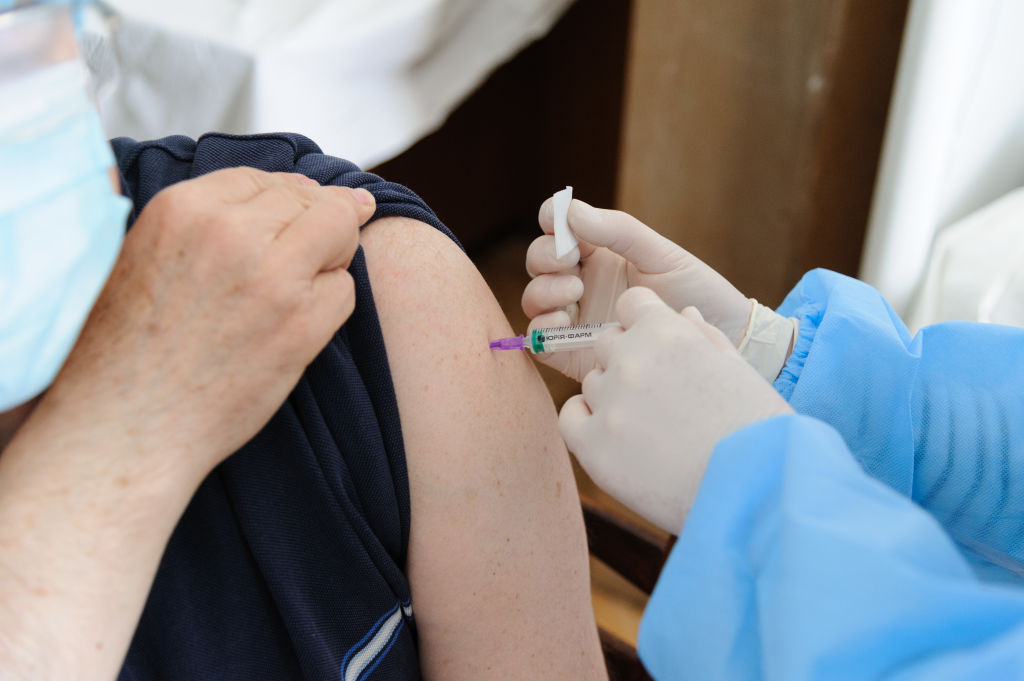
A health worker holds a vial of the AstraZeneca vaccine at a hospital. /Getty
A health worker holds a vial of the AstraZeneca vaccine at a hospital. /Getty
Editor's note: Thomas O. Falk is a London-based political analyst and commentator. He holds a Master of Arts in international relations from the University of Birmingham and specializes in U.S. affairs. The article reflects the author's opinions and not necessarily the views of CGTN.
Various European nations resumed the use of AstraZeneca's COVID-19 vaccine on March 18 after EU and British regulators moved to shore up confidence in the shot.
However, the temporary suspension of vaccinations owing to cases of thrombosis in 13 EU states over these past days is emblematic and shows that Europe's crisis management remains suspect. After all, the decision has vast implications, health-wise, as well as politically.
The EU's reaction was exaggerated and risky since the step was taken when no correlation between vaccine and thrombosis was established. Complications among millions of vaccinations across Europe always needed to be anticipated. Vaccines can have side effects, just as ordinary pharmaceutical drugs.
Blood clots unfortunately occur in humans, not only since the COVID-19 vaccinations were launched. In order to justify a vaccination stop with AstraZeneca, it needed to be established whether or not the number of thrombosis cases among the vaccinated individuals exponentially exceeds the number within the general public.
However, even without extensive research data, one should have been able to presume that this was not the case. After all, more than 11 million people in the UK have been vaccinated with AstraZeneca. Thrombosis occurred in three cases. The ratio is similar in Germany: After 1.6 million vaccinations, seven cases of thrombosis are known.
Statistically, there are four cases of thrombosis for every million people vaccinated with AstraZeneca. This does by no means establish the aforementioned exponential increase in thrombosis cases. In the general – unvaccinated – public, thrombosis occurs about two to five times in less than a million people per year.
The latter should have been the deciding factor. There is no debate that if it had been proven that AstraZeneca can likely be linked to cases of thrombosis, the suspension would have been fully justified. However, that deciding factor did not exist, and the decision to halt AstraZeneca vaccinations on nothing more than a suspicion was simply false.
The WHO concurred and almost immediately stated that it continues to recommend the vaccine as the benefits outweigh the risks. The UK's Medicines and Healthcare products Regulatory Agency upheld the WHO's assessment shortly after, saying people should get vaccinated as soon as asked.
There was no evidence that the AstraZeneca COVID-19 vaccine causes thrombosis, Britain's health regulator concluded after a "thorough and careful review" – all while the country, unlike 13 European nations, continued to vaccinate with AstraZeneca.

A health worker gets a shot of the AstraZeneca vaccine at a hospital. /Getty
A health worker gets a shot of the AstraZeneca vaccine at a hospital. /Getty
The temporary suspension has further exacerbated Europe's subpar vaccination track record, as further delays are now likely to occur – in a fight where every second can make the difference between life and death. Approximately 4,000 individuals in Europe die of COVID-19 per week. This sad figure will likely rise with the spread of mutants and increasing incidences. Moreover, vaccine skeptics will now be even less inclined to receive their shot, further adding to the harm the EU state's decision has caused.
But the decision has not only health implications. Politically, it has led to yet another disagreement between Brussels and London.
It was feared that without AstraZeneca, Europe would face even more of a shortage in vaccine supplies. Brussels thus stated it was inclined to impose export restrictions on European vaccines – including to the UK. European Commission President Ursula von der Leyen confirmed the latter by stating that "all options" were currently being examined.
Since February 1, Europe exported at least 41 million doses of vaccine to several different countries, despite already facing a shortage that has resulted in only 4 percent of the European population currently being vaccinated. A circumstance that was hard to explain to the people, as von der Leyen has now admitted.
Already relations between the UK and the European Union were tense. This latest incident will only strain them more. Although Europe will continue to use AstraZeneca, the export stop is not off the table, and the damage has been done. Britain is now well cognizant about how Brussels is willing to deal with its former member state in a worst-case scenario.
Although 40 percent of the British have already been vaccinated, an EU export ban would lead to a significant slowdown in vaccination in the UK, which is why Britain's Foreign Secretary Dominic Raab described as Europe's plan as "brinkmanship."
The political shenanigans between Brussels and London are thus set to continue – at a rather inconvenient time.
(If you want to contribute and have specific expertise, please contact us at opinions@cgtn.com.)

